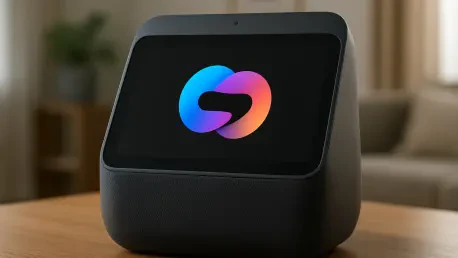In a world where technology is increasingly woven into the fabric of daily life, Google has once again captured attention with a groundbreaking unveiling at a high-profile event in New York City, showcasing not only the latest advancements in the Pixel 10 series but also introducing a transformative smart home speaker tentatively dubbed Gemini for Home. The event painted a vivid picture of a future where artificial intelligence (AI) transcends mere functionality to become an intuitive companion in homes and beyond. With a clear emphasis on enhancing user experience through seamless integration and conversational engagement, Google’s latest innovations signal a pivotal shift in how technology interacts with everyday needs. This development raises intriguing questions about the direction of AI and its potential to redefine personal and household interactions in the coming years.
Exploring Google’s Latest AI Innovations
Unveiling a New Era of Smart Home Technology
At the heart of Google’s recent event was the introduction of Gemini for Home, a smart home speaker designed to replace the familiar Google Assistant with something far more dynamic. Shaped uniquely and accented with vibrant lighting, this device promises to elevate AI interaction by focusing on natural dialogue and deep contextual understanding. Unlike traditional assistants that rely heavily on specific commands, Gemini for Home aims to engage users in a more organic way, handling a broad spectrum of tasks with ease. From organizing schedules and managing shopping lists to offering creative support like brainstorming ideas or crafting stories, its versatility stands out. Furthermore, its ability to process multiple requests simultaneously—such as adjusting home settings in one go—demonstrates a significant leap toward streamlining daily routines for greater efficiency and convenience.
The implications of Gemini for Home extend beyond individual tasks to a broader vision of interconnected living. For music enthusiasts, the device offers tailored searches for songs and playlists based on context, while its conversational design allows for seamless follow-up queries, fostering a more engaging user experience. Additionally, the upcoming Gemini Live feature is set to provide advanced assistance in troubleshooting devices, guiding culinary endeavors, and even addressing health-related questions. This level of personalization suggests a future where technology anticipates needs before they are explicitly stated, adapting to individual preferences with remarkable precision. As early access rollout approaches in October, anticipation builds around how this innovation will integrate with existing Google speakers and displays, potentially setting a new standard for smart home interaction across both free and paid versions.
Pixel 10 Series and Beyond: AI in Mobile Devices
Alongside the smart home focus, Google’s event spotlighted the Pixel 10 series, powered by the cutting-edge Tensor G5 chip for enhanced performance and efficiency. While maintaining a familiar design, these devices introduce the Magic Cue assistant, a feature crafted to minimize app-switching by delivering information directly within a unified interface. This development reflects a broader strategy to embed AI deeply into mobile technology, ensuring users experience a fluid and intuitive interaction with their devices. The Pixel 10 Pro Fold, a robust foldable smartphone, and the Pixel Watch 4, tailored for lifestyle integration, further underscore Google’s commitment to creating a cohesive ecosystem where AI enhances every touchpoint of user engagement with technology.
Expanding on this vision, the Pixel 10 series represents more than just hardware upgrades; it embodies a shift toward personalization through intelligent software. The integration of AI-driven features aims to anticipate user needs, offering solutions before challenges arise, whether through smarter notifications or streamlined access to information. This approach aligns with industry trends that prioritize user convenience over mere technical prowess, signaling a maturing market where emotional resonance with technology becomes as critical as functionality. As Google continues to refine these devices, the interplay between mobile and smart home AI, such as Gemini for Home, hints at a future where all aspects of digital life are interconnected, creating a seamless bridge between personal and environmental interactions.
The Future of AI-Driven User Experience
Redefining Interaction Through Conversational AI
Looking ahead, Gemini for Home emerges as a potential game-changer in how technology integrates into daily environments, prioritizing conversational engagement over rigid command structures. Its design to handle complex, multi-layered requests—think adjusting multiple home settings with a single prompt—points to an era where AI becomes less of a tool and more of a partner. This shift is poised to redefine user expectations, pushing the boundaries of what smart devices can achieve in terms of empathy and adaptability. As the tech industry watches this rollout, the consensus grows that AI must evolve to prioritize intuitive understanding, a trend that Google appears to champion with this latest innovation in its product lineup.
Beyond immediate functionality, the broader implications of conversational AI lie in its capacity to foster deeper connections between users and their technology. Gemini for Home’s ability to assist with diverse tasks, from practical household management to creative endeavors, suggests a future where devices learn and adapt to individual lifestyles over time. This personalization could transform mundane interactions into meaningful exchanges, enhancing quality of life in subtle yet profound ways. As details of its early access launch in October unfold, including compatibility with existing systems, the tech community eagerly anticipates how this device will influence broader adoption of AI-driven solutions in homes worldwide, potentially setting a benchmark for competitors to follow.
A Vision for Seamless Technological Integration
Google’s overarching strategy, as revealed during the NYC event, was to weave AI seamlessly across its entire product ecosystem, from smart home speakers to mobile and wearable devices. The synergy between Gemini for Home and the Pixel 10 series highlighted a commitment to creating technology that not only performs but also anticipates and adapts to user needs with uncanny precision. This vision of integration aimed to eliminate friction in daily interactions, ensuring that whether at home or on the go, users experienced a consistent and intelligent technological environment that felt effortless and natural.
Reflecting on this milestone, the event served as a testament to the power of AI to bridge gaps between disparate devices, crafting a unified user journey. The advancements in contextual understanding and conversational depth, particularly with Gemini for Home, paved the way for future innovations that could further blur the lines between human and machine interaction. As the industry absorbed these developments, the focus shifted to how such technologies could inspire actionable progress, encouraging developers and manufacturers to prioritize user-centric design in the next wave of AI evolution. This moment marked a significant step forward, urging a collective push toward smarter, more responsive solutions for tomorrow’s challenges.









